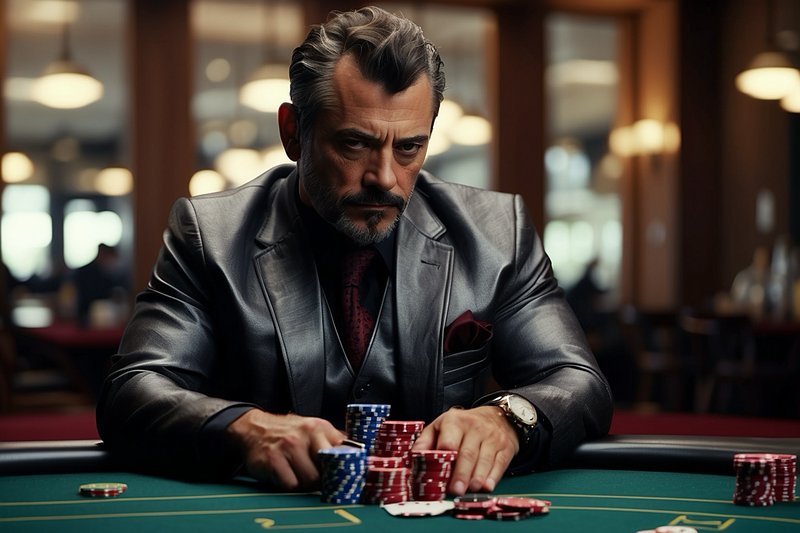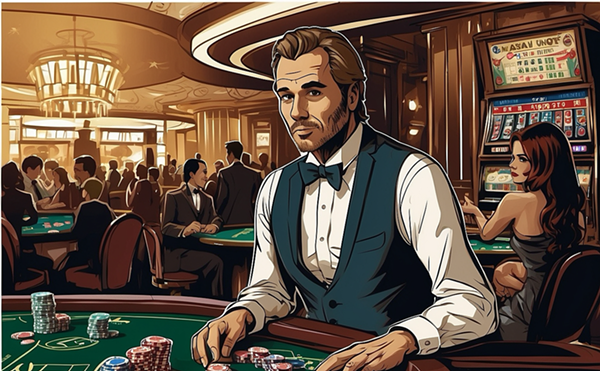In blackjack, players must understand the game's fundamental rules and card values to strategize effectively. Competence in these basics is crucial before methods such as doubling down can be leveraged for successful gameplay.
Understanding the Game
Blackjack is a card game played against the dealer where the objective is for the player's hand to achieve a total card value closer to 21 than the dealer's hand without exceeding it. Each player starts with two cards, and per turn, may request more cards ("hits") to increase the hand's value. A game round begins with the players placing their initial bets. After receiving their initial two cards, players have several options including "hitting," "standing," or making special moves such as "doubling down" or "splitting."
Card Values and Hands
It is essential for players to recognize card values:
- Numbered cards retain their face value (2 through 10).
- Face cards (Jack, Queen, King) are valued at 10.
- The Ace can be worth either 1 or 11, depending on which benefits the hand.
The best hand in blackjack is an "Ace" and a "10" card, making a total of 21, which is known as a "blackjack." If a player's hand exceeds 21, they "bust" and automatically lose regardless of the dealer's hand. If the player's initial two cards do not form a blackjack, they must decide how to play their hand to optimize their chances of winning against the dealer's hand.
Double Down Fundamentals
In Blackjack, mastering the art of doubling down can significantly enhance a player's winning potential. This section provides a deep dive into the essentials of doubling down, outlining what it is, when to apply it, and how to interpret the dealer's up card.
Definition and Purpose
Doubling down is a powerful move in Blackjack where a player can double their initial bet after receiving their first two cards. The player then receives one additional card, with no option for further hits. The primary purpose of doubling down is to maximize winnings when the player is in a favorable position.
When to Double Down
The strategy dictates that a player should generally consider doubling down in the following situations:
- Total of 9: Double down when the player's cards total a hard 9 and the dealer's up card is between 2 and 6.
- Total of 10 or 11: It is advisable to double down when the player has a total of 10 or 11 and the dealer's up card is less than the player's total.
- Soft 16, 17, or 18: Players holding an Ace paired with a 5, 6, or 7 (soft 16, 17, or 18) should double down if the dealer shows a lower card.
Reading the Dealer's Up Card
Understanding the dealer's up card is critical in deciding whether to double down:
- Weak Up Card (2-6): If the dealer shows a card between 2 and 6, they are more likely to bust, which means the player has a stronger opportunity to double down.
- Strong Up Card (7-Ace): Caution is advised if the dealer has a strong up card; players should refrain from doubling down unless holding a robust total.
Strategies for Doubling Down
When it comes to Blackjack, doubling down is a powerful move that can significantly increase a player's winnings when used strategically. Each situation regarding hard or soft totals demands specific attention to optimize the chances for success.
Hard Totals Strategy
A player with a hard 9, 10, or 11 should consider doubling down due to the high potential of getting a strong final hand. The basic strategy chart indicates that for hard totals:
- Hard 9: Double down when the dealer's up card is between 3 and 6.
- Hard 10: Almost always double down unless the dealer's card is a 10 or an Ace.
- Hard 11: Double down in all situations apart from when the dealer has an Ace.
The rationale is that these scenarios present the highest probability of winning the hand, as the dealer is more likely to bust or end with a lower total.
Soft Totals Strategy
When a player holds a soft 16, 17, or 18, the presence of an Ace provides flexibility. Using common strategy charts, they suggest:
- Soft 16 and 17: Double down if the dealer shows a card ranging from 2 to 6, which are traditionally weaker positions for the dealer.
- Soft 18: Double down when the dealer's up card is between 2 and 6; however, if the dealer shows a 7 or 8, the player should stand, and hit if the dealer has a 9, 10, or an Ace.
Utilizing these strategies appropriately requires a good understanding of basic blackjack strategy and the ability to adjust based on the game's dynamics.
Rules and Table Conditions
In the intricacies of blackjack, a player's options and the house edge can be significantly influenced by the particular table rules and dealer's constraints. These factors often determine the optimal strategy for doubling down.
Understanding Table Rules
Table rules surrounding the double down option can vary from casino to casino. Commonly, casinos allow players to double down on any two cards, while others restrict this action to hands that total a specific value, often 9, 10, or 11:
- Any Two Cards: Players may double down on their initial hand regardless of its total.
- Total Restrictions: Some tables only permit doubling down on specific hand values such as 9, 10, or 11.
It is crucial for players to also be aware of whether the table allows doubling down after splitting a pair, as not all casinos permit this action.
Dealer's Constraints
The dealer's up card plays a crucial role in a player's decision to double down. Here's how:
- Dealer's Weak Up Card: If the dealer shows a card between 2 and 6, they are more likely to bust, making it advantageous for players to double down with a strong hand.
- Dealer Shows an Ace: Players should exercise caution when the dealer's up card is an ace due to the higher probability that the dealer will achieve a strong hand.
The house edge, the statistical advantage that the casino has over players, can also be affected by these rules. For example, a table that allows doubling down on any two cards provides a slight advantage to players, potentially reducing the house edge.
Advanced Techniques
In Blackjack, leveraging advanced techniques can significantly optimize a player's double down strategy. This section delves into the nuances of strategy variations and the influence of card counting on deciding when to double down.
Strategy Variations
The effectiveness of any double down strategy hinges on the game's specific rules and the player's hand. When players encounter a hard total—a hand without an ace or with an ace valued at one—they may adhere to a basic strategy which suggests doubling down on certain totals (typically a hard 9, 10, or 11) against particular dealer upcards. A more nuanced approach arises when dealing with a soft hand—a hand with an ace counted as eleven. Players should double down on soft hands when they have an advantage, such as a soft 16, 17, or 18, and the dealer's upcard is weak.
One must also consider whether the rules permit doubling after a split. If allowed, this can be an advantageous move when a player has split a pair and received a favorable card on one or both of the new hands.
Card Counting Influence
Card counting is a strategy employed to gauge the probability of receiving a favorable card. This technique can influence a player's decision to double down by providing insight into whether the remaining deck is rich in high-value cards, which can bolster a player's hand.
A strategic player will adjust their double down decisions based on the count. High positive counts signify a surplus of high cards remaining, thus encouraging more aggressive doubling down, as the chances of achieving a total closer to 21 increase. Conversely, negative counts, indicative of a deck rich in lower-value cards, caution a player against doubling down due to a higher risk of busting or achieving a weaker hand.
Bankroll and Betting
In blackjack, effective bankroll and betting strategies are critical for maximizing profits and minimizing losses. Knowing when to double down is an advantageous position that can be leveraged with sound betting tactics and bankroll management.
Wagering Strategies
A player's approach to wagering in blackjack can greatly influence the outcome of their sessions. Here are common strategies:
- Flat Betting: A player wagers the same amount on each hand.
| Advantages | Disadvantages |
| Simplicity | Limited profit amplification |
| Low risk | May not maximize potential profits |
- Progressive Betting: Adjusting bet sizes based on the outcome of previous hands. This can be positive (increasing stakes after wins) or negative (increasing stakes after losses).
Managing Your Bankroll
Proper bankroll management is key to long-term success in blackjack. A player's bankroll is the total amount of money they have set aside for wagering.
- Reserve Bets: It's advised to have a reserve that can support at least 6 bets to mitigate risk. For example, if a player's standard bet is $100, they should have a minimum of $600 as a buffer.
- Risk Management: A player must assess the risk of each wager and avoid betting more than they can afford to lose, ensuring that they can sustain potential losses without depleting their bankroll.
- Advantageous Position: Doubling down colocates the opportunity to increase a wager in a strong positional play, which should be considered within the larger context of bankroll health.
Playing Blackjack Online
In the realm of online casinos, blackjack maintains its popularity with seamless transitions from physical tables to digital platforms. Players should be aware of the subtle nuances that set online blackjack apart from its traditional counterpart, and the importance of selecting a trustworthy online casino.
Online Blackjack Differences
Playing blackjack online offers several distinctions from playing in a brick-and-mortar casino. An immediate difference lies in the use of chips and cards. Online blackjack utilizes digital chips and virtual cards, which are represented on the screen rather than physical objects that players can touch. This means the tactile experience of handling chips and cards is absent, but the fundamental rules of the game remain consistent.
In online blackjack, games typically move at a faster pace because shuffling and dealing are instantaneous, allowing players to engage in more hands per hour. Additionally, online blackjack can present a myriad of game variations that might not always be available at land-based casinos.
Random Number Generators (RNGs) are another key element of online blackjack, ensuring that the deal of the cards is fair and unpredictable. Online players should be certain that they are playing at casinos where the RNGs are regularly audited for fairness.
Choosing the Right Online Casino
When looking to play blackjack online, selecting the right online casino is crucial. Players should consider the following aspects when making their choice:
- Reputation: The casino's reputation for fair play and customer service is paramount.
- Licensing: The casino must be licensed and regulated by a reputable authority.
- Security: Strong security measures should be in place to protect personal and financial information.
- Variety: A good range of blackjack variations should be available.
- Bonuses: Look for casinos that offer attractive bonuses that can be used for blackjack.
- Payouts: Ensure that the casino offers reliable and timely payouts.
Players are encouraged to research and read reviews to ensure that the chosen casino meets these criteria. It's important to play at casinos that prioritize the player's experience and offer a fair, engaging, and secure gaming environment.
Maximizing Your Odds
In the game of blackjack, maximizing your odds when doubling down requires a deep understanding of probability and payout structures. Knowledge of the right moments to double down and avoid common mistakes can substantially increase a player's advantage.
Probability and Payouts
When a player doubles down in blackjack, they are effectively betting that their chance of winning with a single card draw is strong enough to justify doubling their original bet. Players must consider the dealer's upcard and the likelihood of busting versus the potential payout.
Odds of Winning a Double Down:
| Player's Hand | Dealer's Upcard | Odds of Winning |
| Hard 9 | 3 through 6 | High |
| Hard 10 or 11 | Lower than dealer's | Generally favorable |
| Soft 16 to 18 | 5 or 6 | Moderate |
The odds can improve if a player has a strong hand where the likelihood of achieving a total closer to 21 with one additional card is high. Conversely, the odds diminish if the dealer shows a strong upcard like a 9, 10, or an Ace. A basic grasp of probability and a keen eye on the potential payout can enhance a player's confidence in doubling down at the opportune moment.
Avoiding Common Mistakes
Players often make mistakes by not recognizing the optimal situations for doubling down and may either do so too frequently or too cautiously. Key errors include:
- Doubling down on a hand of 11 when the dealer shows an Ace. The risk of the dealer having a blackjack or achieving a high hand is substantial.
- Avoiding a double down on soft 17 to 18 against a dealer's low card. Players missing out on this opportunity can be foregoing a sizeable potential advantage.
Accurate knowledge of doubling strategies helps players avoid such pitfalls and concentrate on maximizing their potential for winning while minimizing their risk of losses. It is critical for a player to be well-versed in blackjack strategy charts that address specific hand scenarios to reduce mistakes and improve their overall edge.
Cultural Impact of Blackjack
Blackjack has made a significant mark on both popular culture and the gaming industry, reflecting its status as a casino staple. Its appeal lies in the simplicity of its rules and the depth of its strategic elements.
Blackjack in Popular Culture
Blackjack has long been a fixture in movies, literature, and music, often symbolizing high-stakes risk and sophistication. In cinema, scenes involving blackjack are charged with tension, with the game serving as a backdrop for character development. Films like "Rain Man" and "21" portray blackjack as a game where skill and memory can lead to considerable rewards, contributing to its cool allure.
Significantly, blackjack's presence has extended into various forms of media, reinforcing its influence. Its straightforward play-style makes it a clear favorite in not only casinos but also in virtual and home entertainment.
The Evolution of Blackjack Strategies
Strategies in blackjack have been refined over the years, reflecting the game's profitable potential and dynamic nature. The basis for most strategies involves statistical analysis and probability theory.
- Basic Strategy: A foundational approach, often formatted in easy-to-reference charts, that outlines the optimal move (hit, stand, double down, etc.) for every possible player hand against every possible dealer upcard.
- Card Counting: A more advanced technique that involves tracking the ratio of high to low cards remaining in the deck, thereby informing betting and playing decisions.
These strategies have evolved with the game, influenced by academic research and the work of blackjack professionals. Their development and widespread use illustrate the intellectual appeal of blackjack beyond mere chance, highlighting the game's robust analytical dimension. Casinos have adapted by implementing measures to counteract these strategies, ensuring the game remains a challenging and engaging fixture in gambling culture.
Glossary of Blackjack Terms
In Blackjack, understanding the terminology is critical to mastering the game. Below is a glossary of key terms every player should know:
- 21: The optimal total score a player can achieve; also the initial name of the game before it became known as Blackjack.
- Ace: A card that can count as either 1 or 11 points, making it vital for achieving a 21 or a "Blackjack."
- Blackjack: A two-card hand with a total of 21 points, usually comprising an ace and a 10-value card (10, Jack, Queen, or King).
- Bust: This term refers to a hand with a total score exceeding 21 points, which results in an immediate loss for the player.
- Card: A playing piece in Blackjack, each deck contains 52 cards.
- Count: To track the ratio of high to low cards remaining in the deck, often used in advanced strategies.
- DAS (Double After Split): An option allowing players to double their stake on each hand resulting from a split.
- Hand: The set of cards that a player possesses and uses during the game.
- Hit: To request an additional card from the dealer in hopes of improving the hand's total.
- Payout: The return received on a successful wager, often 1:1 for a winning hand or 3:2 for a blackjack.
- Risk: The likelihood of losing a bet based on the player's hand and the dealer's visible card.
- Score: The total value of a player's hand.
- Split: An option used when a player has two cards of the same value, dividing them into two separate hands.
- Stake: The amount of money wagered on a hand.
- Strategy: Planned actions based on the player's hand and the dealer's visible card to maximize the chances of winning.
- Total: The sum value of a player's hand.
A solid grasp of these terms empowers players to understand the game better and develop effective strategies for each hand they are dealt.
Gameplay Scenarios
In Blackjack, a player's decision to double down is a strategic choice that can significantly increase the chances of a winning hand. The outcome hinges on both the cards in play and the probability of having a favorable next card. Players should grasp the common in-game decisions and be prepared for rare and complex situations.
Common In-Game Decisions
When players face basic gameplay scenarios, the decision to double down often follows straightforward rules that can be guided by strategy charts.
- Hard 9, 10, or 11: Players should consider doubling down when they have a total hand value of a hard 9, 10, or 11, and the dealer's up card ranges from 2 through 6, implying a higher risk of the dealer busting.
- Soft 13 to Soft 17: In cases where the player holds a soft hand (hands that contain an Ace counted as 11) of 13 through 17, doubling down becomes advantageous if the dealer's up card is a 5 or 6, since these dealer hands are more likely to result in a bust.
The table below outlines when a player should typically double down based on their hand and the dealer's up card:
| Player's Hand | Dealer's Up Card | Double Down? |
| Hard 9 | 3, 4, 5, 6 | Yes |
| Hard 10 | 2 through 9 | Yes |
| Hard 11 | 2 through 10 | Yes |
| Soft 13-17 | 5 or 6 | Yes |
Rare and Complex Situations
Players may encounter less common scenarios where the choice to double down requires careful assessment of risk and potential reward, often not covered by standard strategy charts.
- Mixed Hand Values: A player may be dealt cards that require a more nuanced evaluation, like a "hard" hand that teeters on the edge of a high probability of busting. For instance, holding a hard 12 against a dealer's 5 or 6 can be tempting but is rarely advisable due to the high risk of busting.
- Dealer Shows an Ace: If the dealer's up card is an Ace, the risk of the dealer achieving a blackjack or strong hand increases. Players will seldom double down in this scenario, as the probability of ending with a losing hand is significant.
Decisions in these rarer situations should be made cautiously, assessing both the current hand and the dealer’s potential outcomes. Players often resort to their knowledge of the game, experience, and sometimes instinct when strategy charts do not provide clear guidance.
Etiquette and Interaction
Proper etiquette in blackjack is as crucial as the strategy a player employs. Adherence to table manners and interaction protocols ensures a seamless game for both the dealers and players.
Behavior at the Table
At a blackjack table, players are expected to remain courteous and composed, irrespective of the game's outcome. It is important to handle the chips with respect and to place bets clearly within the designated betting area to prevent any misunderstandings. Any form of celebration or disappointment should be moderated to maintain the table's decorum.
Dealer-Player Interaction
Players should clearly signal their intentions to the dealer through hand gestures, as verbal instructions alone may not suffice due to the noisy casino environment. For instance, a player opting to double down should place an additional wager next to the original bet and not on top of it, and then signal to the dealer by pointing with one finger to indicate they wish to double down.
Tipping the dealer is appreciated, but it should be done by placing a bet for the dealer rather than handing them chips directly. When it comes to exchanging money for chips, the player should lay the cash on the table; the dealer will spread it out for the cameras to see before handing the equivalent in chips to the player. Communication with the dealer should be polite and clear, fostering a respectful and professional gaming environment.
Histories and Personalities
This section sheds light on the influential figures in the game of blackjack and takes a dive into the rich history of the game, considering its impact on casino culture and the house edge dynamics.
Famous Blackjack Players
- Edward O. Thorp: Regarded as the father of card counting, Thorp's book, "Beat the Dealer," published in 1962, revolutionized how the game was approached. His strategies helped players reduce the house edge and even tilt the odds in their favor.
- Ken Uston: An iconic figure in the world of blackjack, Uston was known for his proficiency in team play and card counting. He is famous for suing Atlantic City casinos, leading to a New Jersey Supreme Court ruling that casinos could not ban card counters.
- Don Johnson: In 2011, Johnson made headlines by winning over $15 million from three Atlantic City casinos over a span of six months without counting cards, but by negotiating specific gaming conditions that cut the house edge.
History of Blackjack
- Early Origins: Blackjack's precursor was a game called "Twenty-One," which has references dating back to the early 17th century in Spain and France. The game's goal of reaching 21 points without busting has remained at its core through the centuries.
- Casino Adoption and the Name 'Blackjack': It migrated to the United States in the 19th century, where gambling establishments began to offer bonuses to attract players. One such bonus was a ten-to-one payout if the player's hand consisted of the ace of spades and a black jack (either the jack of clubs or the jack of spades), hence the name "blackjack."
- Evolution of Rules and Strategy: Over time, casinos standardized the rules, such as requiring the dealer to hit on a soft 17, which subtly increased the house edge. Despite this, strategic play, such as using basic strategy tables and card counting, allows skilled players to reduce the house edge significantly.
Frequently Asked Questions
This section addresses common inquiries around the strategic nuances of doubling down in blackjack, guidelines on specific game variations, and insights on how to augment potential winnings.
What is the appropriate strategy for doubling down in blackjack?
The optimal doubling down strategy in blackjack typically involves doubling when holding a hard 11, or a 10 versus the dealer's 9 or less. It can also be favorable to double down with a soft 16, 17, or 18 against a dealer's low card.
Can you double down after splitting a pair in blackjack?
Yes, in most blackjack variations, players have the option to double down on the two hands created after splitting a pair. However, table rules can vary, so it's essential to understand the specific casino's regulations.
What are the rules for doubling down in Red Dead Redemption 2 blackjack?
In Red Dead Redemption 2, the blackjack mini-game follows traditional rules: players are permitted to double down on their initial two cards, which can increase the likelihood of winning more in-game currency.
Is it advantageous to double down on 11 in blackjack every time?
Doubling down on 11 is generally considered a strong move because of the high probability of receiving a card with a value of 10. However, if the dealer's upcard is an ace, caution should be exercised, as the dealer has a strong chance of achieving blackjack.
How do payouts work when you double down in blackjack?
When a player doubles down in blackjack and wins the hand, they receive double their original bet as a payout. If they lose the hand, they forfeit double the initial wager.
When is the best time to double down with soft hands in blackjack?
The best times for doubling down with soft hands—those containing an ace counted as 11—are when the player has a soft 16, 17, or 18, and the dealer's upcard ranges from 4 to 6, indicating a potentially weaker hand for the dealer.






